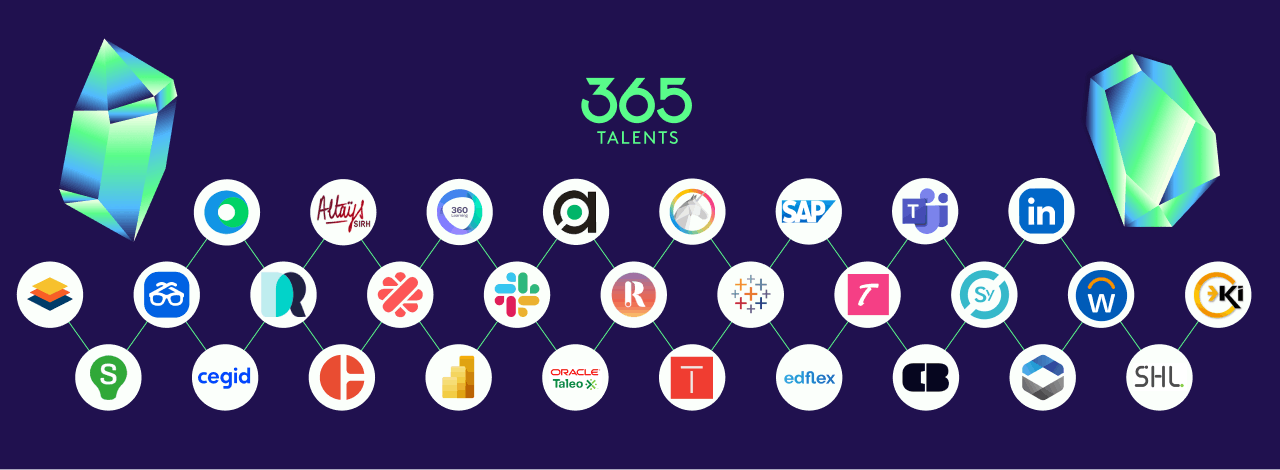How to solve L&D challenges with talent experience integration
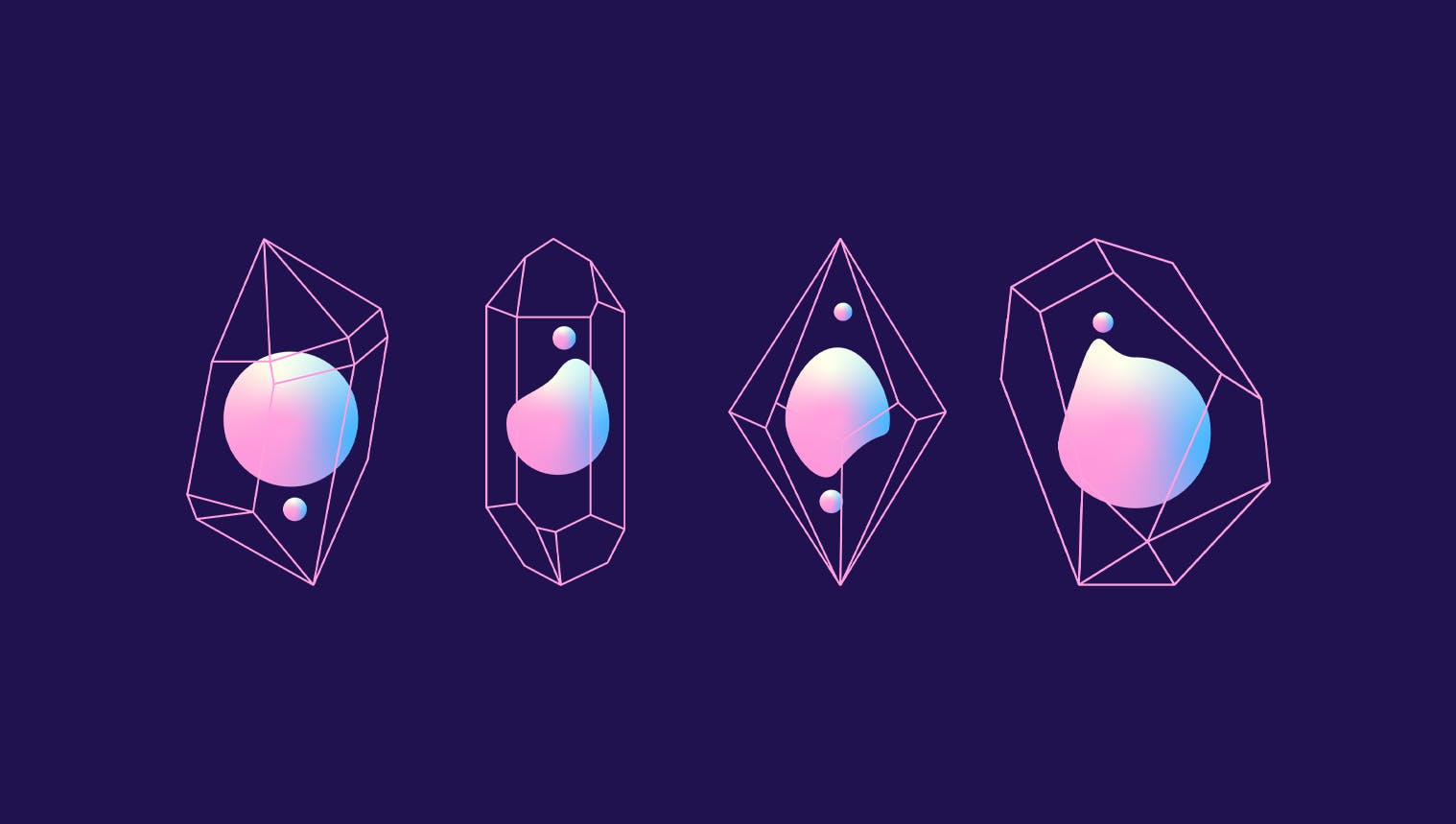
A Learning Management System (LMS) is a valuable tool that plays a crucial role in learning and development (L&D) initiatives. A good LMS can keep employees updated with industry trends and foster continuous learning. By granting access to a wide range of digital learning opportunities, an LMS enables employees to track their progress, acquire qualifications, certifications, and essential skills, thereby facilitating their career advancement and providing HR with robust data analytics and reporting on upskilling progress and training effectiveness.
There are several prominent LMS platforms on the market, including Degreed, 360Learning, Syfadis, and LinkedIn Learning, all of which provide comprehensive learning resources to support employee growth and development.
But operating alone in your HR tech stack, there is a limit to the impact an LMS can have on your employees. Integrating your LMS with your talent experience platform facilitates an employee-centric, skills-based HR strategy that empowers employees and encourages them to proactively acquire new skills and explore various career opportunities.
Talent experience integration enhances the personalized learning experience for employees based on their individual skills, job roles, and interests. By leveraging such an integration, HR departments can provide tailored learning opportunities, ensuring employees receive relevant training and resources to enhance their professional growth.
5 common pain points of LMS
- Engaging employees in informative and interactive training programs
- Gathering feedback and insights to understand needs and preferences
- Proving ROI and impact due to ineffective application of knowledge and skills from training
- Mapping trainings into tangible skills and expertise to optimize budget
- Keeping pace aligning training programs with rapidly evolving business needs
Why most LMS struggle to keep pace with the market
This last challenge of keeping up with market evolution is a particularly frequently reported one for HR in the L&D space.
In today's dynamic and competitive business landscape, industries and job roles are constantly changing, demanding employees acquire new skills and knowledge to stay relevant and contribute effectively. Companies need to proactively anticipate these changes and ensure that their employees are equipped with the right skills to adapt and thrive. Failure to do so can result in skill gaps, hindering successful project execution and impeding business growth.
However, identifying these evolving needs and implementing corresponding training initiatives is a daunting task. It requires continuous monitoring and analysis of industry trends and the organization's strategic objectives to identify the emerging skills and knowledge required. Once the skill gaps are identified, it then requires designing and implementing effective training programs to address those gaps. Finally, ensuring adoption of training programs and the implementation of new skills is also a challenge. The whole process demands significant time and effort to stay updated and informed.
How integration solves challenges and amplifies the impact of your LMS
What is an LMS talent experience integration?
A talent experience LMS integration, such as the one offered by 365Talents, creates a frictionless flow of communication between your talent experience platform – home to your talent’s career development data and profiles, and your company’s skills intelligence, strategic workforce planning, and supply and demand data – with your learning platform – home to your people’s upskilling/reskilling resources, training programs and learning experience. Data related to your users, skills and talent marketplace is thus shared through a series of customizable connectors to facilitate the unification of a shared skills framework across your tech stack.
More specifically, 365Talents offers LMS integration on three levels.
Integration level 1: Employee profile
When an employee creates their profile, all information from your LMS learning history will be suggested to help them declare completed trainings and their related skills.
Every time a new learning is completed, the information is sent automatically to 365Talents.This way we can suggest adding this information to their profile in one click.
This connector also allows us to add to their profile all the key information including training description, date and skills, and use this updated information to improve skills & jobs suggestions.
Integration at the employee level:
- Connects your platforms and engages your employees with an up to date profile
- Collects all training history from your LMS to automatically update 365Talents employee profile
- Links training history to skills to better understand employees and offer more personalized suggestions
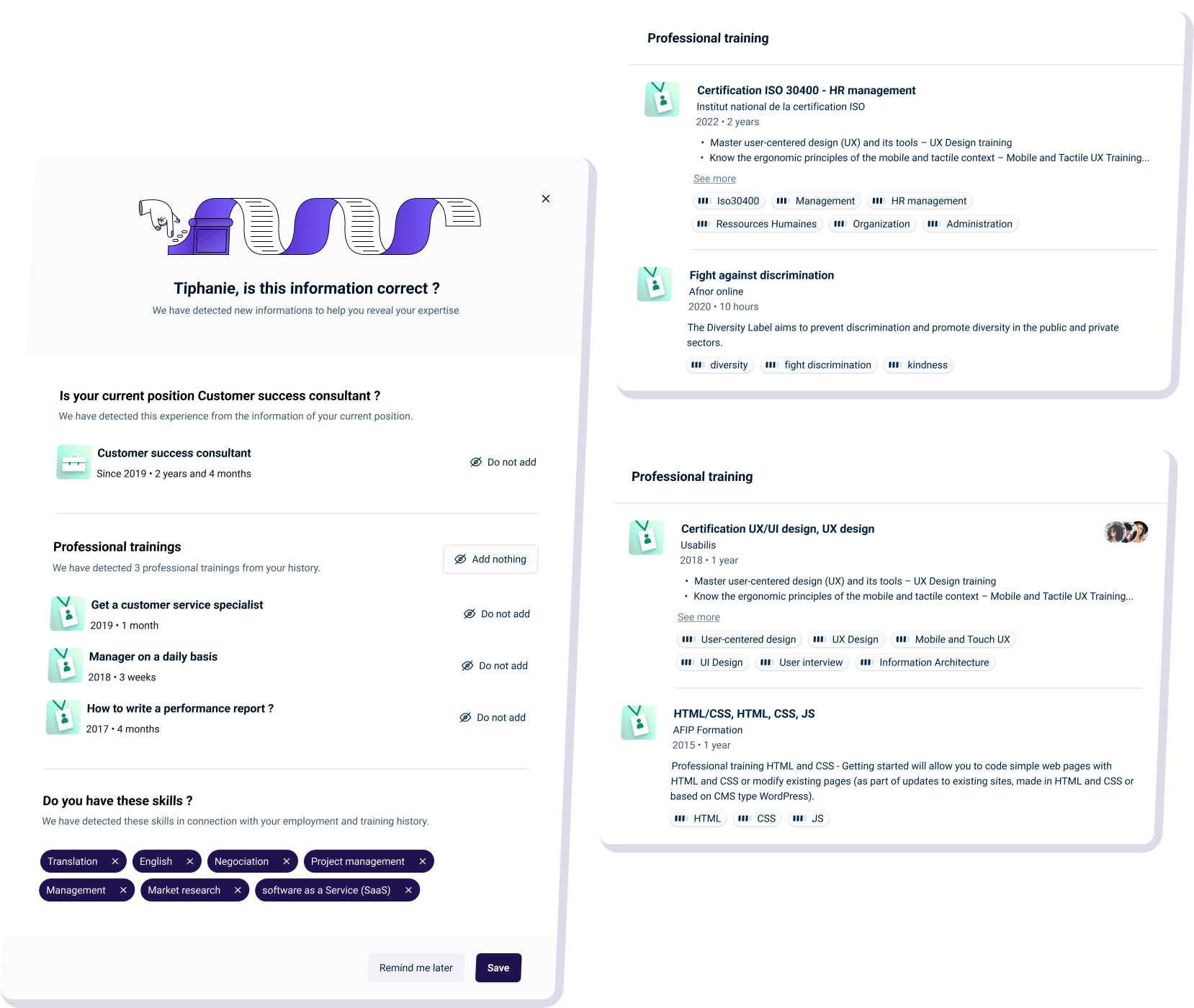
Integration level 2: Smart suggestions
365Talents imports your LMS training catalog to create personalized suggestions on the 365Talents Talent Marketplace and redirect back to your LMS to access learning assets.
Our AI uses your skills framework to automatically detect, extract and assign skills that will be acquired from your learning assets. It then dynamically matches your learning assets with your employees’ skills, ambitions, current job and career development interests.
Integration at the suggestions level:
- Leverages your training catalogue and engages your employees with more relevant suggestions
- Aligns your training catalogue and associated skills with your talent experience platform
- Generates personalized matching between your employees and your learning assets
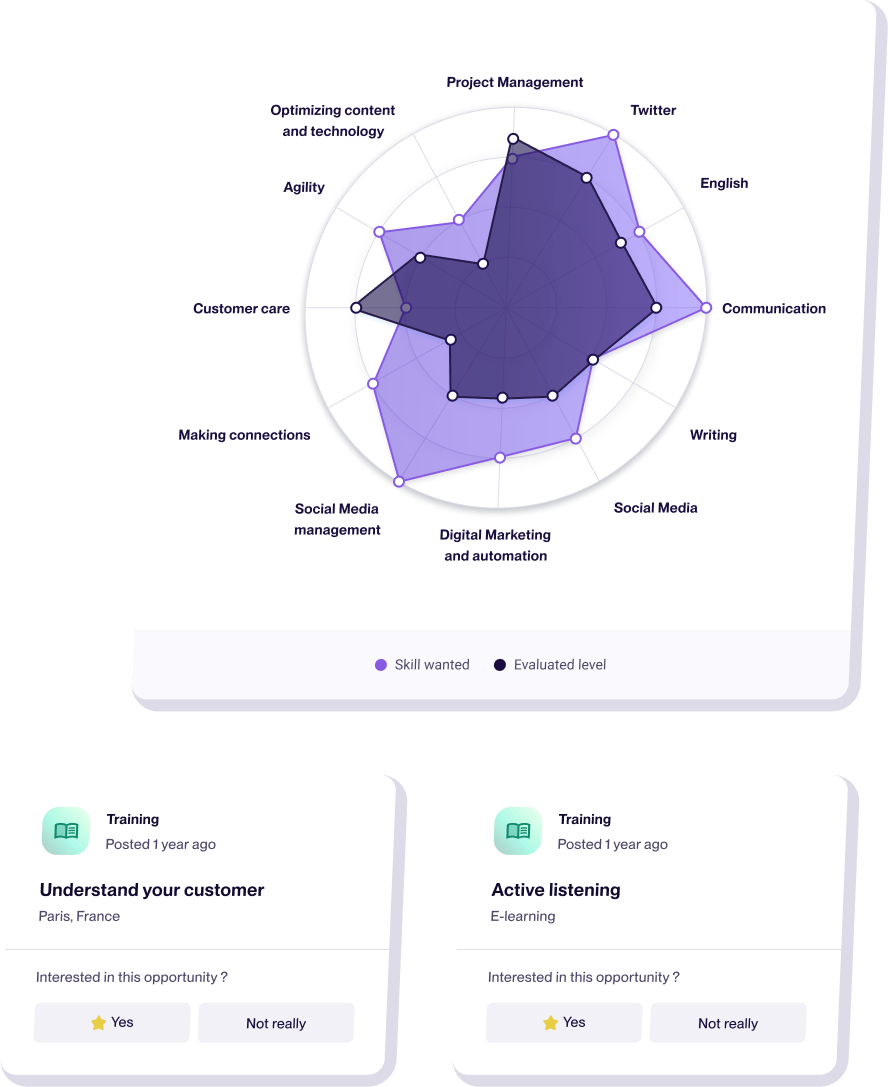
Integration level 3: Skills harmonization
The third level of integration features the creation of a common skills vernacular that aligns all the inputs and data across your tools for optimized interoperability.
All your skills across all platforms are brought together in one unique central point and aligned in one common set of terms, called a skills vernacular or skills language. Your skills framework is supercharged with the data from your LMS and your HR has access to unique tools to structure and leverage skills intelligence for greater business impact.
Integration at the skills harmonization level:
- Offers a user-friendly experience for all your people to declare and manage skills
- Creates a common skills language for all your tools to communicate seamlessly
- Visualizes and manages the associated ontologies to understand and use the skills anywhere and in expressed anyway
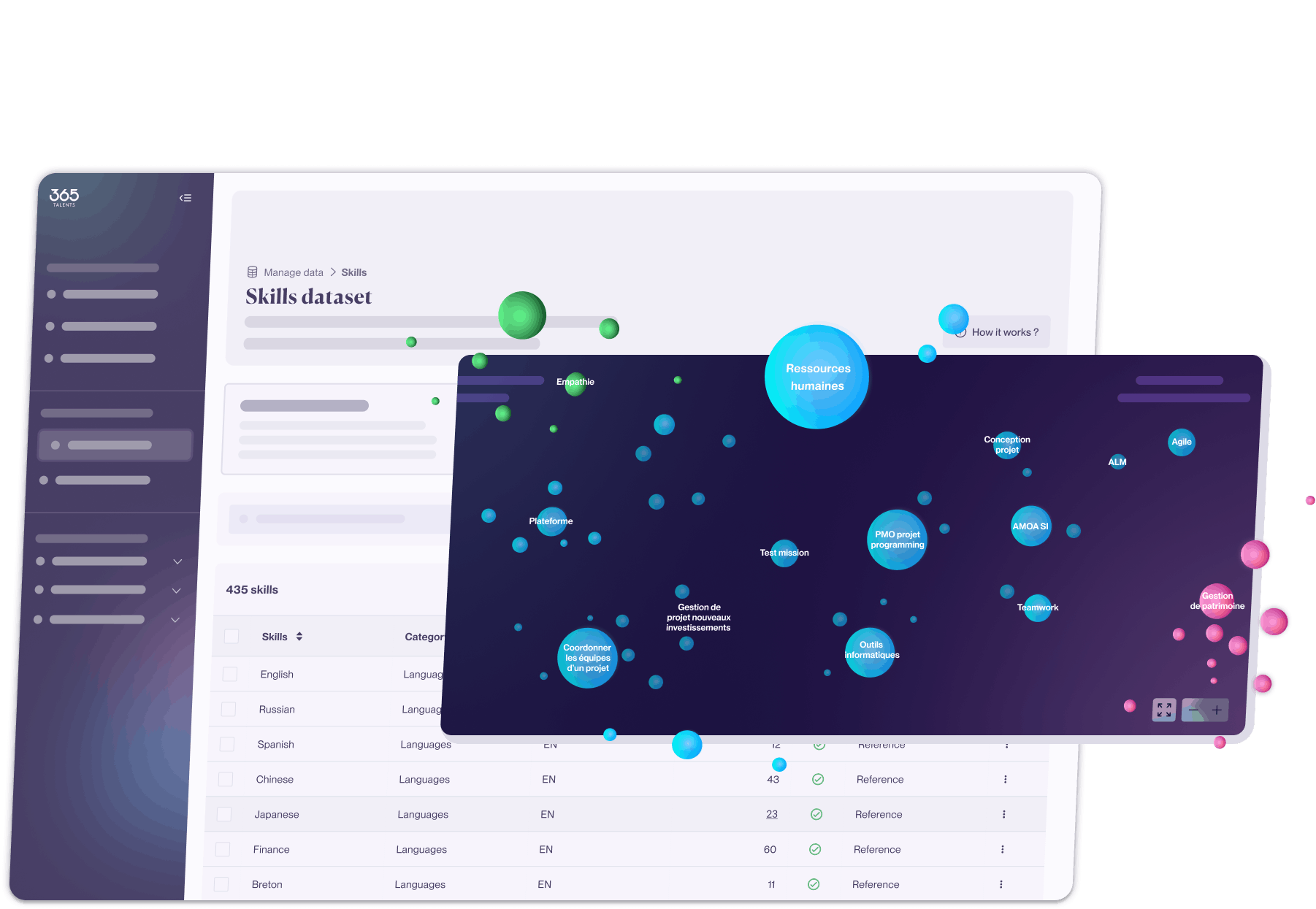
For clients who already have a well-established LMS with high engagement rates who seek to maintain the single-tool experience, 365Talents also offers a white-label integration, meaning that all 365Talents functionalities are embedded into your LMS and share the same visual charter as your LMS.
There is no need to login twice, all users have access to all functionalities with a single login. 365Talents solutions act like smart add-ons functionalities as part of your LMS platform.
This option maintains and facilitates the seamless user experience of a single platform for employees, while providing HR with a centralized skills framework and the tools to enhance internal mobility and career development while offering a streamlined career management process and simplified learning journey.








Why integrate your LMS with a talent experience like 365Talents
For your employee
Integration with 365Talents engages employees and enhances their career development by providing smart suggestions tailored to each individual, employees can make progress on their career path.
A talent experience centralizes all skills information, enabling employees to have a complete overview of their capabilities in one place. This not only facilitates self-assessment but also allows organizations to identify and leverage the expertise of their workforce. With a full learning history documented on employee profiles, employees can showcase their acquired knowledge and skills, highlighting their areas of expertise.
Additionally, 365Talents employee and career path intelligence feature provides valuable insights, enabling organizations to recommend new learning opportunities that align with employees' career aspirations. Employees have access to a convenient one-stop shop for declaring their skills, fostering a culture of continuous learning and professional growth.
For your HR admins
Incorporating 365Talents into your organization provides unique insights for HR administrators that can significantly improve your team's training initiatives. By leveraging the platform's capabilities, you can effectively identify and address both current and future skills gaps, enabling you to plan targeted upskilling programs. 365Talents also enables HR to identify internal experts to tap into their knowledge and experience for collaborative trainings, fostering a culture of knowledge sharing and peer-to-peer learning.
Furthermore, 365Talents integration enables you to compare your organization's skill needs with the available learning assets, ensuring that your training efforts align with the specific requirements of your workforce. By mapping individual and team skills gaps, you can efficiently address these gaps and implement tailored solutions, maximizing the effectiveness of your training initiatives and driving continuous improvement throughout your organization.
For HR & Managers
With a talent experience integration, HR and managers can unlock a multitude of benefits, including a significant boost in talent and learning key performance indicators (KPIs). These solutions contribute to increased engagement among employees, leading to improved learning outcomes and overall performance.
Integrating these tools creates a unified language for your skills strategy, ensuring seamless communication and alignment across different platforms. This integration enhances the effectiveness of talent management and learning initiatives by fostering a cohesive approach.
Moreover, data and experience integration enables organizations to access comprehensive insights and analytics, empowering data-driven decision-making and facilitating continuous improvement. This combination of powerful solutions, streamlined skills strategies, and integrated data and experiences paves the way for organizational success and growth.
LMS integration benefits summary
Integrating your LMS with a talent experience solution can offer an effective means of addressing these challenges. Such an integration brings together the unique capabilities of both platforms, enabling organizations to effortlessly track employees' skills and competencies, identify any skill gaps that exist, and provide targeted training programs to address those gaps, leading to enhanced learning outcomes and greater ROI.
Talent experience integration allows organizations to create personalized learning paths for each employee, leveraging their specific skills, competencies, and job requirements. This tailored approach to learning leads to improved learning outcomes, as employees receive training that precisely aligns with their individual needs and objectives.
By integrating an LMS with a comprehensive talent experience solution, organizations can maximize their return on investment in both platforms. This integration fosters a more holistic approach to talent management and learning and development, optimizing the utilization of these powerful tools. The combined capabilities of the integrated system contribute to improved business outcomes by ensuring that employees are equipped with the right skills, leading to increased productivity, efficiency, and overall success.
To learn more how integrating your LMS with our talent experience can help you achieve L&D objectives, get in touch with the 365Talents team today.
Uncover more HR insights







